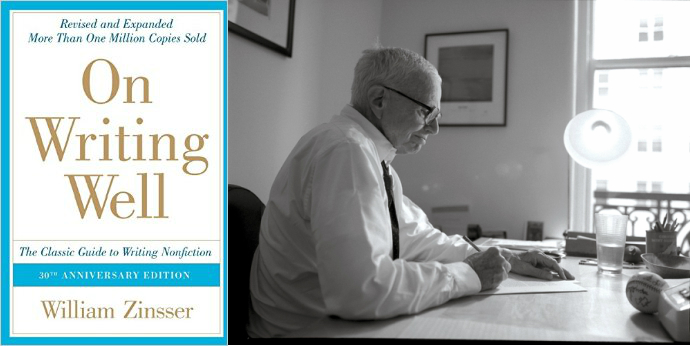
Image by Mark Ostow/Yale Alumni Magazine
I have learned a lot about writing since I started here at elitefts two years ago. Most of this instruction has been informal with the help of Dave Tate, Bob Ihlenfeldt, Steve Colescott, Jordan Houser, James Clear. One of the most important aspects of becoming a better writers is writing more. In this industry, I have seen plenty of article that fall short and plenty that are great reads. The more we read and the more we write, the more obvious, and eventually fulfilling, good writing becomes.
The following is a short, comprehensive list of tips for writing that I wanted to share from openculture.com.
10 Writing Tips from Legendary Writing Teacher William Zinsser, May He Rest in Peace
Author William Zinsser died at his Manhattan home on Tuesday, May 12, 2015. The 92-year-old left behind one of the classics of writing instruction manuals as his legacy, On Writing Well. Since its first printing in 1976, the book has sold 1.5 million copies, and Zinsser made sure to update the book often. He loved the revolution in writing that computers brought, calling it a miracle.
Never have so many Americans written so profusely and with so few inhibitions. Which means that it wasn’t a cognitive problem after all. It was a cultural problem, rooted in that old bugaboo of American education: fear.
Zinsser stressed simplicity and efficiency, but also style and enthusiasm. Here are 10 of his many tips for improving your writing.
1. Don’t make lazy word choices: “You’ll never make your mark as a writer unless you develop a respect for words and a curiosity about their shades of meaning that is almost obsessive. The English language is rich in strong and supple words. Take the time to root around and find the ones you want.”
2. On the other hand, avoid jargon and big words: “Clear thinking becomes clear writing; one can’t exist without the other. It’s impossible for a muddy thinker to write good English.”
3. Writing is hard work: “A clear sentence is no accident. Very few sentences come out right the first time, or even the third time. Remember this in moments of despair. If you find that writing is hard, it’s because it is hard.”
4. Write in the first person: “Writing is an intimate transaction between two people, conducted on paper, and it will go well to the extent that it retains its humanity.”
5. And the more you keep in first person and true to yourself, the sooner you will find your style: “Sell yourself, and your subject will exert its own appeal. Believe in your own identity and your own opinions. Writing is an act of ego, and you might as well admit it.”
6. Don’t ask who your audience is…you are the audience: “You are writing primarily to please yourself, and if you go about it with enjoyment you will also entertain the readers who are worth writing for.”
7. Study the masters but also your contemporaries: “Writing is learned by imitation. If anyone asked me how I learned to write, I’d say I learned by reading the men and women who were doing the kind of writing I wanted to do and trying to figure out how they did it.”
8. Yes, the thesaurus is your friend: “The Thesaurus is to the writer what a rhyming dictionary is to the songwriter–a reminder of all the choices–and you should use it with gratitude. If, having found the scalawag and the scapegrace, you want to know how they differ, then go to the dictionary.”
9. Read everything you write out loud for rhythm and sound: “Good writers of prose must be part poet, always listening to what they write.”
10. And don’t ever believe you are going to write anything definitive: “Decide what corner of your subject you’re going to bite off, and be content to cover it well and stop.”
Zinsser follows his own advice, in that this book (pick up a copy here) is a joy to read, with a rollicking humor and an infectious enthusiasm. May he rest in peace!
Finally, as someone who can’t stand to hear the word ‘unique’ modified, Zinsser has this to say: “…being ‘rather unique’ is no more possible than being rather pregnant.’”
Related Content
David Ogilvy’s 1982 Memo “How to Write” Offers 10 Pieces of Timeless Advice
Ray Bradbury Offers 12 Essential Writing Tips and Explains Why Literature Saves Civilization
Writing Tips by Henry Miller, Elmore Leonard, Margaret Atwood, Neil Gaiman & George Orwell
Ted Mills is a freelance writer on the arts who currently hosts the FunkZone Podcast. You can also follow him on Twitter at @tedmills, read his other arts writing at tedmills.com and/or watch his films here.
Read the original article here
Source: www.openculture.com








